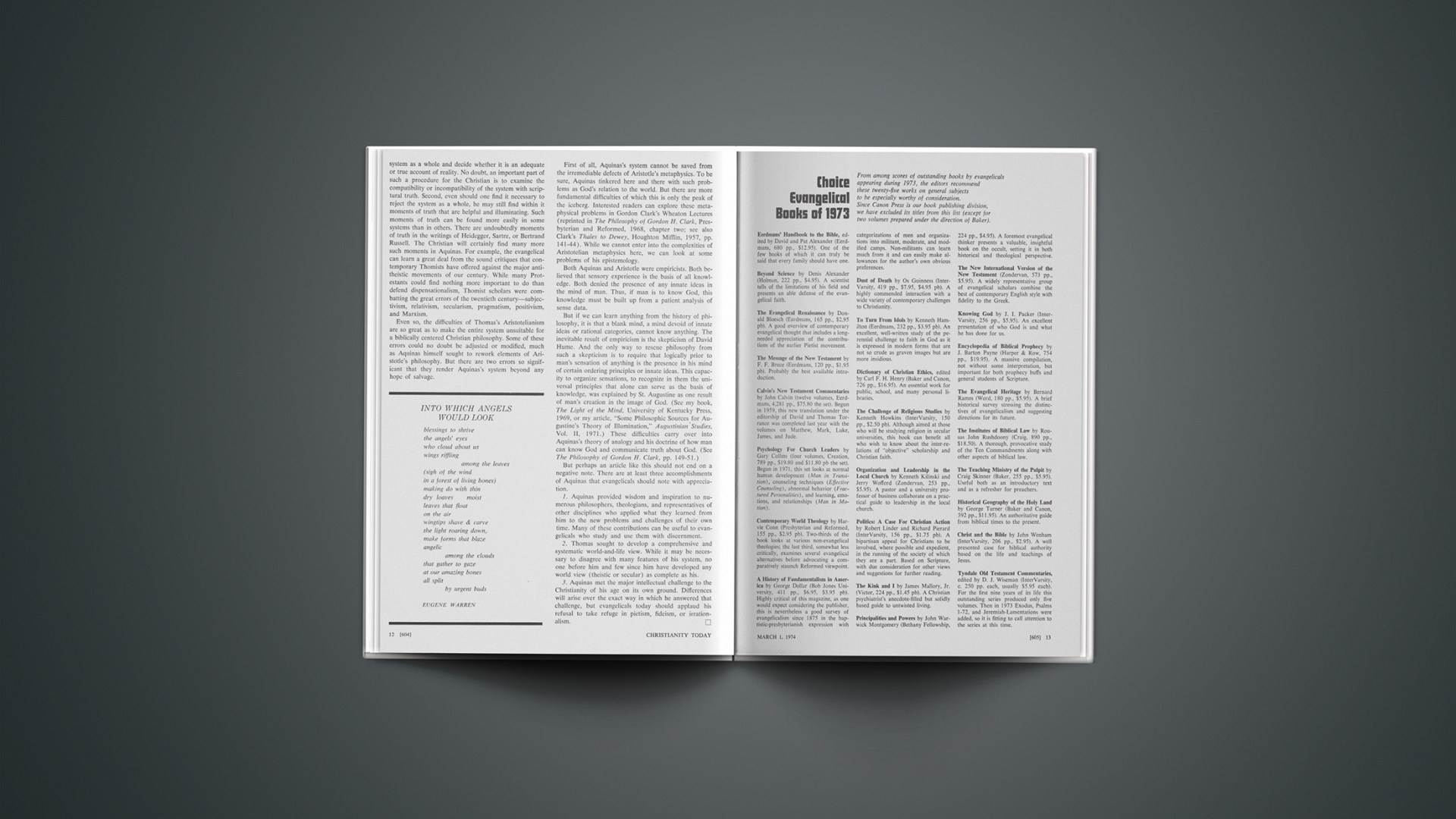From among scores of outstanding books by evangelicals appearing during 1973, the editors recommend these twenty-five works on general subjects to be especially worthy of consideration. Since Canon Press is our book publishing division, we have excluded its titles from this list (except for two volumes prepared under the direction of Baker).
Eerdmans’ Handbook to the Bible, edited by David and Pat Alexander (Eerdmans, 680 pp., $12.95). One of the few books of which it can truly be said that every family should have one.
Beyond Science by Denis Alexander (Holman, 222 pp., $4.95). A scientist tells of the limitations of his field and presents an able defense of the evangelical faith.
The Evangelical Renaissance by Donald Bloesch (Eerdmans, 165 pp., $2.95 pb). A good overview of contemporary evangelical thought that includes a long-needed appreciation of the contributions of the earlier Pietist movement.
The Message of the New Testament by F. F. Bruce (Eerdmans, 120 pp., $1.95 pb). Probably the best available introduction.
Calvin’s New Testament Commentaries by John Calvin (twelve volumes, Eerdmans, 4,281 pp., $75.80 the set). Begun in 1959, this new translation under the editorship of David and Thomas Torrance was completed last year with the volumes on Matthew, Mark, Luke, James, and Jude.
Psychology For Church Leaders by Gary Collins (four volumes, Creation, 789 pp., $19.80 and $11.80 pb the set). Begun in 1971, this set looks at normal human development (Man in Transition), counseling techniques (Effective Counseling), abnormal behavior (Fractured Personalities), and learning, emotions, and relationships (Man in Motion).
Contemporary World Theology by Harvie Conn (Presbyterian and Reformed, 155 pp., $2.95 pb). Two-thirds of the book looks at various non-evangelical theologies; the last third, somewhat less critically, examines several evangelical alternatives before advocating a comparatively staunch Reformed viewpoint.
A History of Fundamentalism in America by George Dollar (Bob Jones University, 411 pp., $6.95, $3.95 pb). Highly critical of this magazine, as one would expect considering the publisher, this is nevertheless a good survey of evangelicalism since 1875 in the baptistic-presbyterianish expression with categorizations of men and organizations into militant, moderate, and modified camps. Non-militants can learn much from it and can easily make allowances for the author’s own obvious preferences.
Dust of Death by Os Guinness (Inter-Varsity, 419 pp., $7.95, $4.95 pb). A highly commended interaction with a wide variety of contemporary challenges to Christianity.
To Turn From Idols by Kenneth Hamilton (Eerdmans, 232 pp., $3.95 pb). An excellent, well-written study of the perennial challenge to faith in God as it is expressed in modern forms that are not so crude as graven images but are more insidious.
Dictionary of Christian Ethics, edited by Carl F. H. Henry (Baker and Canon, 726 pp., $16.95). An essential work for public, school, and many personal libraries.
The Challenge of Religious Studies by Kenneth Howkins (InterVarsity, 150 pp., $2.50 pb). Although aimed at those who will be studying religion in secular universities, this book can benefit all who wish to know about the inter-relations of “objective” scholarship and Christian faith.
Organization and Leadership in the Local Church by Kenneth Kilinski and Jerry Wofford (Zondervan, 253 pp., $5.95). A pastor and a university professor of business collaborate on a practical guide to leadership in the local church.
Politics: A Case For Christian Action by Robert Linder and Richard Pierard (InterVarsity, 156 pp., $1.75 pb). A bipartisan appeal for Christians to be involved, where possible and expedient, in the running of the society of which they are a part. Based on Scripture, with due consideration for other views and suggestions for further reading.
The Kink and I by James Mallory, Jr. (Victor, 224 pp., $1.45 pb). A Christian psychiatrist’s anecdote-filled but solidly based guide to untwisted living.
Principalities and Powers by John Warwick Montgomery (Bethany Fellowship, 224 pp., $4.95). A foremost evangelical thinker presents a valuable, insightful book on the occult, setting it in both historical and theological perspective.
The New International Version of the New Testament (Zondervan, 573 pp., $5.95). A widely representative group of evangelical scholars combine the best of contemporary English style with fidelity to the Greek.
Knowing God by J. I. Packer (InterVarsity, 256 pp., $5.95). An excellent presentation of who God is and what he has done for us.
Encyclopedia of Biblical Prophecy by J. Barton Payne (Harper & Row, 754 pp., $19.95). A massive compilation, not without some interpretation, but important for both prophecy buffs and general students of Scripture.
The Evangelical Heritage by Bernard Ramm (Word, 180 pp., $5.95). A brief historical survey stressing the distinctives of evangelicalism and suggesting directions for its future.
The Institutes of Biblical Law by Rousas John Rushdoony (Craig, 890 pp., $18.50). A thorough, provocative study of the Ten Commandments along with other aspects of biblical law.
The Teaching Ministry of the Pulpit by Craig Skinner (Baker, 255 pp., $5.95). Useful both as an introductory text and as a refresher for preachers.
Historical Geography of the Holy Land by George Turner (Baker and Canon, 392 pp., $11.95). An authoritative guide from biblical times to the present.
Christ and the Bible by John Wenham (InterVarsity, 206 pp., $2.95). A well presented case for biblical authority based on the life and teachings of Jesus.
Tyndale Old Testament Commentaries, edited by D. J. Wiseman (InterVarsity, c. 250 pp. each, usually $5.95 each). For the first nine years of its life this outstanding series produced only five volumes. Then in 1973 Exodus, Psalms 1–72, and Jeremiah-Lamentations were added, so it is fitting to call attention to the series at this time.










